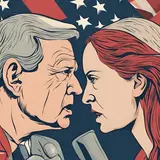Navigating the Noise: How to Avoid the One-and-Done Bias in Elections

In “Don’t Regret Your Vote: One-and-Done Bias” for Psychology Today, Thomas Bateman discusses the "one-and-done" bias, a tendency to form an initial opinion about a candidate and stick to it, even in the face of new information. This bias can lead to voting for a candidate who doesn't align with one's true beliefs or priorities.
Bateman suggests some strategies for overcoming this bias, and they begin with simply recognizing that such a bias exists, and that it can impact our potential decision-making. He also encourages engaging in open-minded discussions with others, considering different viewpoints, and actively seeking out new information (and critically evaluating it). We would all be more thoughtful and intentional with our political choices if we took the time to think carefully about their implications. Voters can make more informed and considered decisions, reducing the likelihood of future regrets, if they employ such mindfulness strategies.
This "one-and-done" bias is highly relevant to teachers in today's political climate, because it reflects on our role in developing critical thinking and open-mindedness in students. If students develop this bias, they may be less likely to engage with diverse perspectives, or adapt to new information. Students might have a tendency to dismiss viewpoints that challenge their initial beliefs even when presented with evidence that contradicts their previous assumptions, which would hinder their understanding of complex issues. Given the polarizing state of partisan politics, many students already struggle to update their knowledge and skills as the world evolves.
What can teachers do to counteract this bias? They can begin by encouraging students to question information and consider multiple perspectives, as Bateman suggests. A classroom culture that values diverse opinions and respectful debate allows students to recognize their own biases, and teachers can instill a growth mindset so that students associate intelligence with effort and learning.
By addressing the "one-and-done" bias, teachers get to empower students to become lifelong learners who are equipped to navigate a complex and ever-changing world.
How are our students being influenced? Where are they getting their information about political candidates, and should teachers take the initiative to address those topics in the classroom?